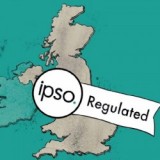 The press watchdog has ruled a warning it issued to journalists about a man who did not want to be interviewed was invalid after he complained about one newspaper subsequently approaching him.
The press watchdog has ruled a warning it issued to journalists about a man who did not want to be interviewed was invalid after he complained about one newspaper subsequently approaching him.
John Gordon, the owner of a Northern Irish private security company, asked the Independent Press standards Organisation to issue a private advisory notice after a story about he and his staff being attacked while involved in a controversial eviction was widely reported by multiple media outlets.
Mr Gordon told IPSO he did not want to comment to the media about the incident, and a notice was circulated to a number of newspapers on his behalf stating that he and his family did not intend to make any comment about the eviction – further requesting that journalists desist from contacting them or attending at their home.
However, the day after this notice was issued he was contacted via email from a journalist acting on behalf of Belfast’s Sunday Life.
Mr Gordon claimed this approach had been in breach of his request to desist, but IPSO has now ruled after an investigation that the request for comment related to new and distinct claims, adding the notices do not act as blanket bans on all contact from journalists or prohibit the printing of future stories about a subject.
The initial story reported claims Mr Gordon and his staff had been attacked by 20 armed persons in an attempt to reclaim property in Roscommon, in the Republic of Ireland, with several employees and their dogs allegedly being beaten and hospitalised as a result.
This story was widely reported in Northern Ireland and the Republic of Ireland, and footage of the incident was widely shared.
The day after the private advisory notice was circulated in relation to this incident, the Sunday Life journalist asked Mr Gordon in an email for confirmation that he had been subcontracted to work at several high-profile events in Northern Ireland, and whether he had made the companies which employed his firm aware that it was now being investigated by the Private Security Authority, in the Republic of Ireland, as a result of the incident in Roscommon.
The email acknowledged the existence of the recent IPSO private advisory notice, and said that given the nature of the story there was a public interest in giving the complainant the opportunity to respond.
Mr Gordon claimed this behaviour was in breach of his request to desist, and thus amounted to harassment under Clause 3 (Harassment) of the Editors’ Code of Practice.
Sunday Life accepted that it had been involved in contact which engaged the terms of Clause 3, but denied that there was any breach of the Code.
It said that as the incident in Roscommon had been widely reported and was a matter of public debate, there was therefore a public interest in reporting the fact that Mr Gordon’s business, which was now also under investigation by authorities in the Republic of Ireland and is the subject of various other serious concerns about its conduct, had also provided security for high-profile public events and had links to other well-known companies.
These points had not previously been reported on or addressed by Mr Gordon, and as such Sunday Life said that it was appropriate and diligent to give the complainant a right of reply to the claims, noting the private advisory notice only referred to contacts regarding the Roscommon eviction incident and not contacts regarding all future stories about him.
Sunday Life had also contacted IPSO for advice prior to making contact and believed the subsequent action taken by the journalist was proportionate, in that it had sent only a single email to a publicly available address.
IPSO found that an approach by a journalist after such a private advisory notice has been issued may constitute a failure to respect a request to desist, but the notices do not act as blanket bans on all contact from journalists or prohibit the printing of future stories about a subject.
The request for comment was justified in the public interest and related to new and distinct claims, with IPSO noting Sunday Life had not asked Mr Gordon for comment on the eviction incident.
The complaint was not upheld, and the full adjudication can be read here.





 Follow HTFP on Twitter
Follow HTFP on Twitter